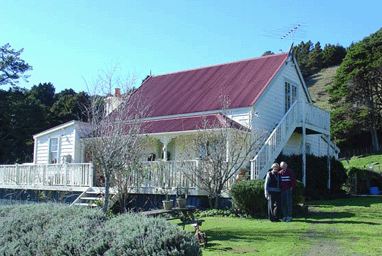Joseph Bayer (1871 -
1949) and
Katherina
Wech (1879 - 1943)
Katherina
Wech (known as Catherine and daughter of
Josef Wech and Dorathea Schott) was born June 20, 1879 in Puhoi. Joseph Bayer
(son of
Petrus Bayer and Magdelena Lederer) was
born January 11, 1871 in Bohemia. He was a farmer.
Joseph and Catherine were married in Puhoi
on April 23, 1901 when he was aged 30 and she 21.
Their family
Joseph and Catherine had 11 children (10 surviving) and at least 19
grandchildren: |
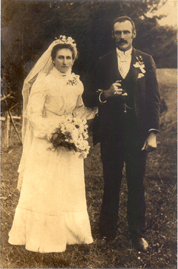 |
- Mary Bayer was born August 14, 1902. She married James Brien and they
had four children, James Brien, Mary Brien, Michael Brien and Elsie Brien. She
died in 1988 aged 86.
- Doreen Bayer (died shortly after birth)
- Anton Joseph Bayer (Tony)
was born May 20, 1905 and died aged 93. He
never married but his brother said that he got engaged a lot! He was a "hard
case"!
- Theresa Annie Bayer
was born Feb 14, 1907. In 1935 she gave birth to a
son James Bayer. She later married Lindsay Coles and they had another son,
Thomas Coles. She killed herself tragically shortly after Thomas' birth in 1940.
- Christian Peter Bayer
was born June 25, 1909 and married Kathleen
Barker. They had two boys, Raymond and Donald Bayer. When they later seperated,
Donald stayed with his father and Raymond with his mother.
- Edward John Bayer (Ted)
was born Sept 25, 1911. He married Ethel
Wilson and they had two boys, Mervyn and Desmond Bayer. He died when aged about
80. Ethel had a bad heart and died a year later.
-
Catherine Elizabeth Bayer
(Katie) was born May 31, 1913 in
Upper Waiwera. She married Robert Patrick Simpson April 23, 1938 and they had 3
children,
Brian Robert Simpson, Dulcie Simpson and Noleine Simpson.
- Thomas Wenzyl Bayer (Tom)
was born June 10, 1915 and married Barbara
Holloway (born either 1926 or 1930) in St Matthews Church, Central Auckland in
1947. They had two children, John Bayer and Catherine Bayer.
- Christina Dorothy Bayer
was born May 20, 1917. She married James
Kelly. They had no children. She died quite young of cancer aged in her 40's.
- Alice Margaret Bayer
was born Sept 16, 1919. She married William
Adams. They had four boys, Barry Adams, Harold Adams, Colin Adams and Terence
Adams. They later divorced. She died aged about 60 from cancer.
- Nora Agnes Bayer
was born March 4, 1921. She married Fred MacFarlane.
They had no children. Nora died on 15 August 2004 aged 83 from stomach cancer.
Joseph and Catherine had their farmland
homestead in Upper Waiwera built by his brother Fritz, using trees etc from
around the property. The tracks they used to cart the trees down the hill are
still visible today. The property originally consisted of 600 acres of farmland.
When the street to their property was put in it was named Bayer Road (it still
carries this name today).
The children were all born at the Bayer
homestead with the assistance of midwives. A midwife would come and stay in the
house for 3 days after the birth of each child. The family would avoid calling
for a doctor from Warkworth unless absolutely necessary, as they charged
£20 (the equivalent of maybe $1000
nowadays). The family lived a hard life working on the farm and providing for
themselves. They grew most of their food themselves, buying only the essentials
such as flour and sugar in bulk from the store in Puhoi.
|
They grew all their own vegetables and fruit. They had "every fruit
imaginable" - peaches, apples, nectarines, plums... At harvest time all the
crop would be kicked and carefully stored to last as long as possible.
Apples would be sliced and dried and stored in sacks (6 sacks the size of
large pillows each season). The potatoes were laid out in single layers in a
storage shed and the children would be sent in regularly to pick off and
sprouts that grew from the potatoes. The potatoes lasted for ages, as did
many of the other crops, as the family knew how to care for them.
The children remembered their parents
working long days. Their father was very strict and whipped the boys a lot
whenever they didn't do what he asked of them. They very scared of him.
Their mother (pictured right) worked hard but adored her children and doted on them
particularly when they were sick. Tom was very attached to his mum and
remembers when he was about 2 and very ill from Scarlet Fever (his hair went
ghostly white!) she carried him around with her for three days. The children
were concerned with how hard their mum worked because they loved her so
much. They can't remember her every smacking them - presumably that was left
to the father!
The whole family used to go to church on
Sundays. The boys hated it! Tom marvelled at how their mother managed to get
all the kids cleaned and tidy for it in time! Their father insisted they
went every Sunday, no matter what. If the children were sick they still had
to go. They were punished if they resisted. |
 |
The 4 boys slept in the upstairs loft.
They didn't have many blankets (they were too expensive for the family to
afford) so they made blankets out of flour bags etc, torn open and sown
together. The roof was simply corrugated iron on a wooden frame - there was no
insulation or lining. In summer it was sweltering hot, and in winter it got very
cold and the underside of the iron roof would form condensation and would drip
onto the children's beds! The boys had to jump out of bed before they were
dripped on in the mornings! Their sisters slept in bunks in bedrooms on the main
level. Theresa used to sleep walk as a child and would walk up the steep stairs
to the boys room - it was a miracle that she never fell down!
Joseph always set out the daily work for all
the family. The boys all got up at 5am to milk the cows and tend to the other
animals (even carting the cream 2kms down the road by horse and cart before
breakfast). During the summer they'd milk all 25 cows, then during the winter
they'd just milk a few in order to supply milk, cream and butter for themselves.
The butter was stored in boxes with vents hanging from trees in the shade, and
it lasted well there.
The girls worked inside the house, cleaning,
washing, preparing the meals and so on. Clothes were handmade and passed down
through the children. Tom joked that when he got the hand-me-downs from Edward
the shorts would hang down way below his knees. No-one cared whether the clothes
fitted or not - they were just clothes to keep them warm etc.
The children vividly remembered walking
barefoot 3 kms every day to and from Upper Waiwera School - Tom estimated that
it would have taken them half an hour. Katie's family believe this is why she
developed such a fondness for shoes. The children used to trek across the rough
country and through streams. Tom said his feet used to get red from the cold.
Later he rode there my horse.
|
Tom hated school and dropped out at 14 to work fulltime on the farm with two
of his brothers, Ted and Christian. They used to collect mail from Waiwera
with a horse and bush cart. The mail came to Waiwera by steamer to the
Waiwera wharf (pictured). Carting was hard work as the roadways were
pure clay/mud. There were large willow trees along the river in the valley
of the Bayer homestead which caused flooding so they had to be removed. The
land on the hills of the valley are quite unstable with slippage visible on
both sides today. |
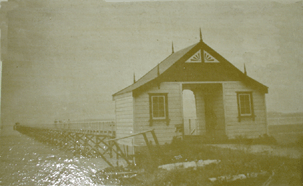 |
Joseph's brother Peter Bayer owned 32 bullocks
for pulling logs out of the bush. The logs they pulled out were mostly Kauri (as
they were worth the most) but there was also some Rimu and Kahikatea. The logs
were very large (1m thick and very long) and could only be pulled out using the
full team of bullocks all chained up together in twos and pulling together. Toms
recalls the harnesses the bullocks wore being cruel on the animals. Each bullock
had a name and its own pen. The logs were pulled down to the stream and into the
river. The older boys would jump on the logs and guide them downstream to
Waiwera where a barge was waiting to take the logs to Turners and Growers in
Auckland. Back in 1925 at the beginning of winter (maybe May), when Tom was
about 10 years old, there were big floods all over the district. Lots of logs
got lost to sea. Joseph hired a launch to go out and retrieve them, they did
manage to find some but many were lost. After the floods, many of the family's
animals, who were determined to follow their usual paths that they took each
day, got into trouble in the mud and got bogged, horses buried to their necks in
the mud! The family only had ropes to pull them out - it was very hard work
pulling the larger animals out, but they managed to do it. The district's
bridges were wiped out by the floods and it took quite some time for them to be
rebuilt, isolating the family for some time. Fortunately the Bayer homestead was
situated high enough to escape the tide, but the water level came very close!
Katie, Chrissy and Nora stayed and worked on
the farm until they married. Mary left home when she was 16 (circa 1918).
Teresa had left home circa 1923 when she was
also 16 years old. She had her son James (Jimmy) Bayer in 1935 before marrying a
few years later. Her husband (Lindsay Coles) was involved in a jellignite
explosion while he was unemployed and assisting with tree felling work. Debris
from the explosion hit him in the head and he lost one of his arms. After that
he went to town and stayed with the Minoahs who became family friends. He became
an alcoholic and got into a fight with another man at a pub a while later. The
man hit him in the head, not particularly hard, but it was found that a blood
clot in his brain from the earlier accident was dislodged by the blow and it
killed him. Shortly after giving birth to their son Thomas in early 1940,
Theresa had a mental breakdown and jumped out of the window at St Heliers
nursing Home, killing herself. Her two orphaned boys were brought back to the
Bayer homestead to live and be cared for by the rest of the Bayer family that
were there at the time.
Christian originally bought a Buick 8-seater
which the family used. Tom remembers it using a lot of petrol. They had this car
for quite a while until Tom wrote it off by accident when he lost control,
tumbling the car down the hill (fortunately neither he nor his brothers, who
were thrown from the vehicle, were seriously injured. Fortunately the car was
insured. Tom then bought a Model A Ford from a store in Auckland for 90 pounds
before the war.
|
When Tom was 16/17 he started working on the Weranui Rd, Kaukapakapa farm.
Tom remembers shearing 100 sheep in a day (on contract) with the old big
shearing scissors for 2s. an hour. His back would seize up and he couldn't
straighten up. His hand would swell up badly too. They would get 3p. a pound
for the wool. Haymaking was also 2s. an hour, baling the hay up into tall
secure stacks for the cattle to feed on over winter. Tom helped build the
Weranui Rd house himself (View from Tom's home shown on right). He
later inherited this property from his mother after her death). It cost him
£1100 to build the house as it was
costly to get the materials to the remote site. Tom worked for 3 years
driving trucks. This property had originally been purchased by his father
for £200. In those days the Government
gave citizens 40 acres of uncleared land at the cost of 10s. an acre. Joseph
would keep buying an additional 40 acres each year, so that by the end the
family owned 800 acres! |
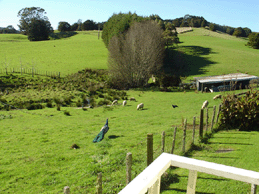 |
Ted and Tom were draughted into the army just
after Christmas in 1939 when Tom was 24 and Ted 27 or 28. Tom was trained with
the Army Territorials and was on Home Guard north of Kaitaia at Awanui.
Mosquitos were rife there and caused the soldiers much grief, getting any skin
that was not covered. They would try and kill them all before they went to bed,
but could still hear them in the dark! In 1941 Tom spied a Japanese submarine
surfacing out in the harbour! The army personnel all ran to high ground and
trained their telescopes on the submarine, and watched it retreat back out to
sea! Tom was in the army for 3.5 years until it was detected that he had a spine
injury and was released from duty. He returned to the farm and continued to work
(never claiming sickness benefit). Ted was shell shocked somehow while on duty
(he never said what did it) and lay unconscious for three weeks. He never came
right and kept saying he wanted to lay down and die. He managed to live to the
ripe old age of 80!
Christian moved from one home to another to
make more money doing odd jobs. He was married at the time the war started and
was therefore not draughted. He looked after the farm when Ted and Tom were away
at camp. After Christian and his wife seperated, his son Donald Bayer (Don) who
was 9 at the time they seperated, came with his father and grew up on the farm
(while his brother Raymond stayed with their mother, although he spent a lot of
time at the farm too). Don was treated more like a brother than a nephew by
Christians siblings. He helped out his uncle Tom on the farm, whose good humour
he remembers getting him into trouble one day. After they'd milked about 30 cows
by hand it was Don's job to turn the seperator to get up to speed to stop the
bell ringing, cream out one side and skim milk out the other for the pigs and
calves. As Tom walked past to pour milk into the vat he would put his finger
under the cream spout and lick it. Don asked him "What was that for?" to which
Tom replied "It puts lead in your pencil" so young Don tried it. When he got to
school he started to write quite vigorously with his pencil. They had a very
attractive relieving teacher at the time, who asked Don why we was writing so
hard. Don replied "Uncle Tom said if you lick the cream it will put lead in your
pencil!". She gave Don the strap. Neil McCathy (who was a close neighbour of the
family) said to him at playtime "He didn't mean that pencil!" but Don still
didn't catch on!
One of Tom's jobs on the family farm was the
repair of the boundary fence between the McCathy's and the home farm. Tom rode
his horse to work and after a week his father decided to inspect the progress
that Tom was making on the fence. So he followed the horse's well-worn track and
ended up at the McCathy house and there was Tom's horse. He knocked on the door
and Mrs McCathy came out. "Is Tom here?" he asked. "Yes" she replied "He is
playing cards with the girls". So Joseph said "That's OK, I'll speak to him
tonight". When he returned home he said to Katherina "Tom hasn't done much work
on the fence he has been spending most of his time at the McCathy's". Now Joseph
was a little deaf, and he said "Mrs McCathy said he is playing with the girls
and the other thing that concerns me is that the horse has been tied up for a
long time and the horse manure is so high on one side of the fence that the
horse can walk over and graze on the other side!".
Tony took off from the family farm and bought
his own farm to buy and sell cattle (His brother Christian soon joined him).
Tony didn't really want to work as a farmer, he would have preferred to be a
businessman. He kept talking about jumping off the wharf to kill himself. Tom
went and had a look and told him "You'll have to wait till the tide comes back
in!". On another occasion Tony threatened to shoot himself while holding an
unloaded gun. Tom went and got some cartridges and gave them to him! At one
stage Tony trained wild horses and even got them into showjumping events. He
fell many times from the horses and ended up with many broken bones (including
his shoulder) which did heal but caused him great problems in his later years.
|
Alice came back to the farm with her 3 boys in the mid 1940's after her
marriage collapsed. Many of the Bayer children's marriages disolved and over
the years they returned to the farm with their children. The house was
filled with many children and grandchildren who slept up in the large attic
room of the house up the long flight of very steep stairs. Christmas Day was
celebrated on the farm every year for many years with grandkids etc all
coming up for the day. In
their later years Joseph and Katherina retired to the bottom house next to
the school, and Tom and Ted took over the farm. Joseph Bayer received 20
pounds a month pension money. Tom still has the solid old tin box that
Joseph used to store his spare cash (Tom is shown here on the left with
his niece Noleine holding the box). Joseph developed cancer and was
nursed by his daughter Nora at Tom's Weranui Rd
home before he died on 22 September 1949 aged 78. Katharina died 6
years before him on 27 July 1943 aged 64.
In Joseph's will, Christian was left 150
acres. Ted and Tom got the rest including the Kaukapakapa property. The
daughters were left nothing, as was the way in those days. |
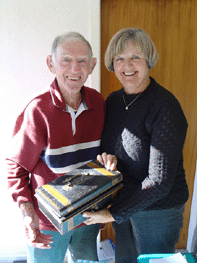 |
The original Bayer homestead still stands proud
today after a fantastic refurbishment by the new owners who bought the house
around 1990. The separate room seen at the far left of the following
pictures was a very small lounge room built later as an addition to the rest
of the house, also built by Joseph's brother Fritz. The children watched him
fall from the ladder one day and laughed at him - so he chased after them
with a hammer! This room was reserved by Joseph and Catherine as a haven for
themselves - the children were never allowed in! This room opened into the
kitchen which looked out from the left side of the house. The stairs inside
the house to the upstairs loft are extremely steep and made from solid
kauri, as were the rest of the floors.
|





